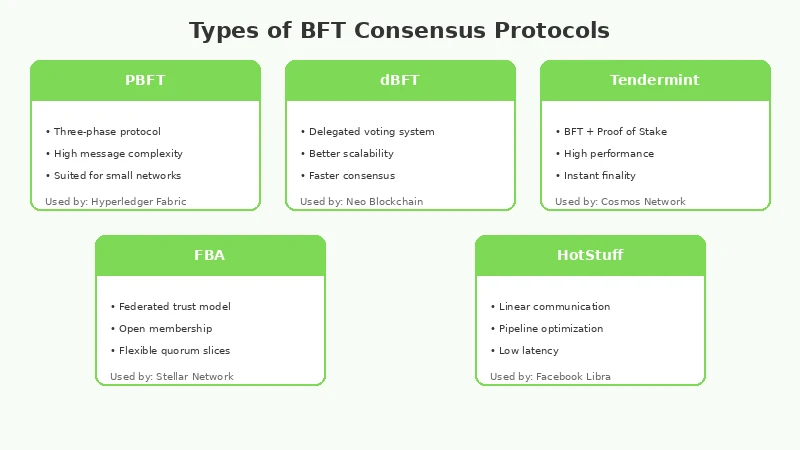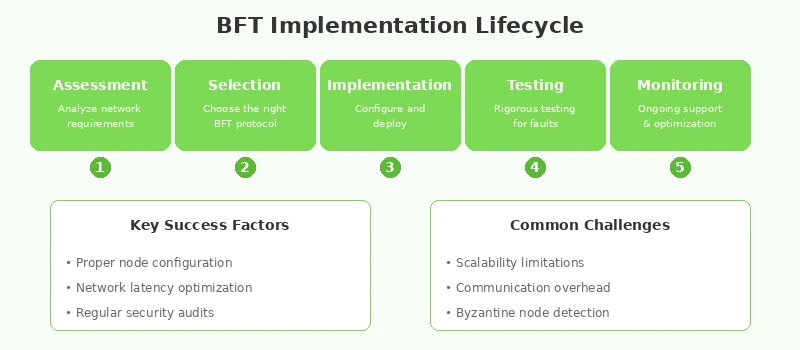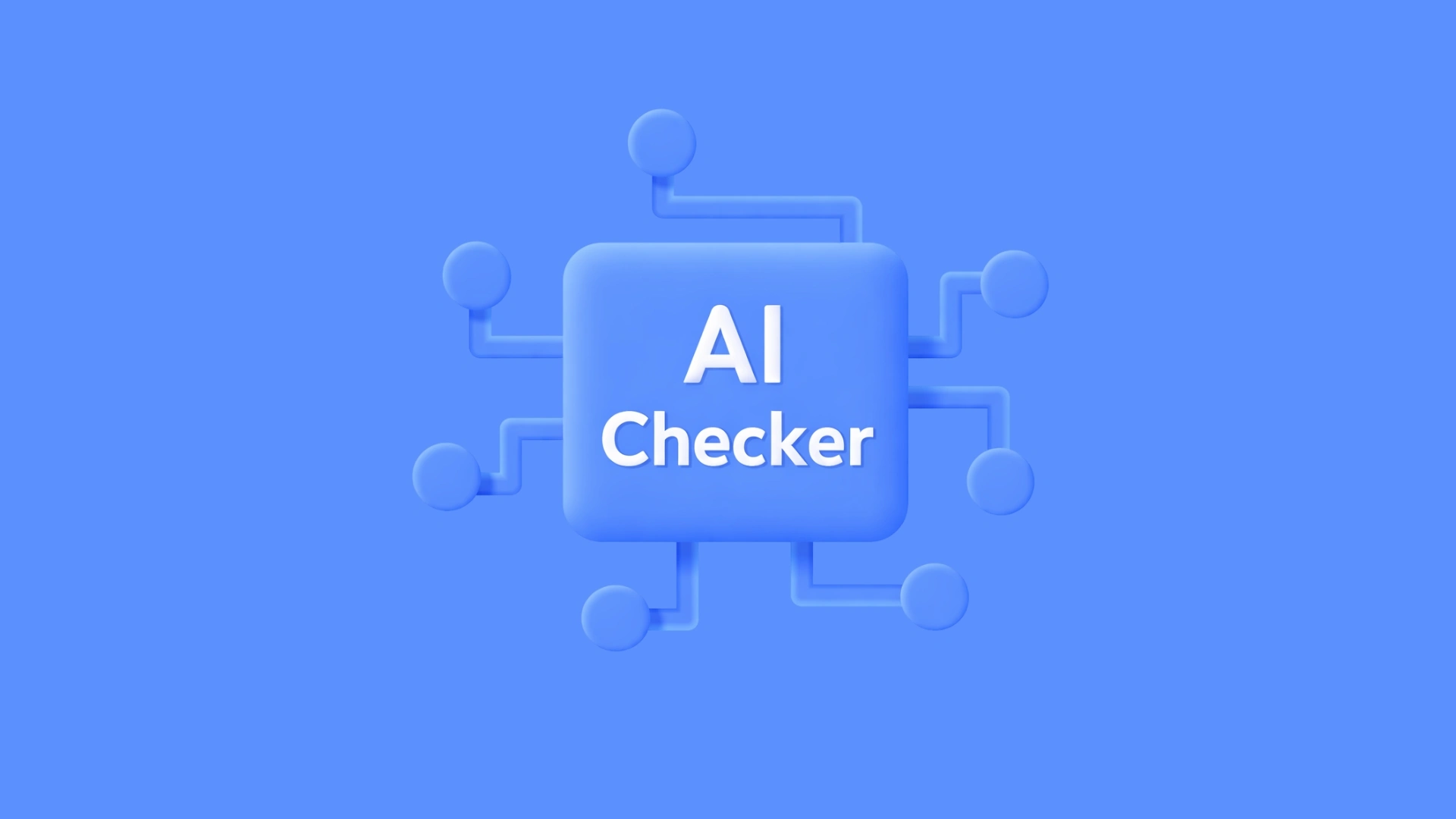Key Takeaways
- Byzantine Fault Tolerance allows blockchain networks to reach consensus even when some nodes are faulty or acting maliciously, requiring at least 3f+1 nodes to tolerate f faulty nodes.
- Different BFT protocols like PBFT, dBFT, Tendermint, and HotStuff serve various blockchain use cases with unique trade-offs between speed, scalability, and decentralization.
- BFT is essential for permissioned blockchains, DeFi platforms, supply chain systems, and any application where transaction finality and security are non-negotiable.
- Proper implementation requires careful assessment, protocol selection, rigorous testing, and ongoing monitoring to maintain network reliability.
- Working with experienced blockchain developers can significantly reduce implementation risks and ensure your BFT system performs optimally under real-world conditions.
Blockchain technology has changed how we think about trust in digital systems. But here is the thing: in any distributed network, not every participant plays fair. Some nodes might fail. Others might try to mess with the system on purpose. This is where Byzantine Fault Tolerance comes into the picture.
If you have been exploring blockchain technology and how it works, you have probably wondered how these systems keep running smoothly even when things go wrong. The answer lies in BFT, a concept that has its roots in a thought experiment from the early 1980s but remains absolutely relevant today.
What is Byzantine Fault Tolerance in Blockchain?
Byzantine Fault Tolerance is a property of distributed systems that allows them to continue operating correctly even when some components fail or behave maliciously. The name comes from a classic computer science problem called the Byzantine Generals Problem, which describes a scenario where military generals must coordinate an attack but cannot trust all the messengers delivering their communications.
In blockchain terms, think of it this way: you have a network of computers (nodes) that need to agree on which transactions are valid. Some of these nodes might be broken. Some might be run by bad actors trying to approve fake transactions or disrupt the network. BFT ensures that honest nodes can still reach agreement and the blockchain keeps working correctly.
The mathematical foundation is straightforward. A BFT system can tolerate up to f faulty nodes as long as the total number of nodes N satisfies the equation N greater than or equal to 3f plus 1. So if you want to handle 3 malicious nodes, you need at least 10 nodes in your network.
Why Does BFT Matter for Blockchain Networks?
Traditional databases assume that all participants are trustworthy. Blockchains cannot make that assumption. When you are dealing with decentralized systems where anyone can participate, you need mechanisms that account for the worst-case scenarios.
BFT addresses three critical challenges in blockchain networks:
Handling Node Failures: Hardware breaks. Software crashes. Internet connections drop. BFT ensures that temporary or permanent node failures do not bring down the entire network. The remaining honest nodes can continue processing transactions without waiting for the failed ones to recover.
Preventing Malicious Attacks: In public blockchains, anyone can run a node. This openness is both a strength and a vulnerability. BFT protocols are designed to detect and isolate malicious behavior, preventing bad actors from corrupting the transaction history or double-spending tokens.
Achieving Finality: Unlike probabilistic consensus mechanisms where transactions become “more confirmed” over time, many BFT protocols provide instant finality. Once a transaction is committed, it cannot be reversed. This is crucial for applications like financial settlements where you need absolute certainty.
Understanding the history of blockchain helps explain why BFT became such a foundational concept. Early blockchain implementations like Bitcoin used Proof of Work, which achieves fault tolerance through computational puzzles. But as the technology evolved, developers recognized that BFT-based approaches could offer faster confirmation times and lower energy consumption for certain use cases.
Types of BFT Consensus Protocols
Not all BFT implementations are the same. Different protocols make different trade-offs between performance, scalability, and security. Here is a breakdown of the major variants you should know about:

| Protocol | Key Features | Best Suited For | Notable Implementation |
|---|---|---|---|
| PBFT | Three-phase commit, deterministic finality, high message overhead | Small to medium permissioned networks | Hyperledger Fabric |
| dBFT | Delegated validators, faster consensus, energy efficient | Smart contract platforms | Neo |
| Tendermint | BFT plus Proof of Stake, modular design, instant finality | Interoperable blockchains | Cosmos Network |
| FBA | Federated trust model, open membership, flexible quorums | Financial networks with known participants | Stellar |
| HotStuff | Linear communication complexity, pipelined consensus | High-throughput enterprise systems | Diem (formerly Libra) |
| ABFT | Handles network delays, no timing assumptions | Unreliable network environments | Hedera Hashgraph |
Practical Byzantine Fault Tolerance (PBFT)
PBFT was one of the first practical solutions to the Byzantine Generals Problem for real-world systems. Developed by Miguel Castro and Barbara Liskov in 1999, it uses a three-phase protocol: pre-prepare, prepare, and commit. The leader node proposes a value, other nodes validate it, and consensus is reached when enough nodes agree.
The downside? PBFT requires O(n squared) messages for n nodes, which means it struggles to scale beyond a few dozen participants. But for enterprise blockchains where you know and trust your validators, it remains a solid choice.
Delegated Byzantine Fault Tolerance (dBFT)
dBFT takes a different approach by having token holders elect a small group of consensus nodes (delegates) who handle the actual validation work. This reduces the number of nodes participating in consensus, which improves performance without completely sacrificing decentralization.
Neo popularized this approach, achieving block times of around 15 seconds with strong finality guarantees. The trade-off is that you are placing trust in the elected delegates, which some argue makes the system less decentralized than pure BFT alternatives.
Tendermint BFT
Tendermint combines BFT consensus with Proof of Stake economics. Validators stake tokens as collateral, and misbehavior results in slashing (losing a portion of their stake). This creates strong economic incentives for honest participation.
What makes Tendermint special is its modular architecture. The consensus layer is separate from the application layer, which means developers can build custom blockchains using Tendermint as the consensus engine. The Cosmos ecosystem is built on this foundation.
Understanding the BFT Fault Tolerance Formula
The mathematics behind BFT is elegant in its simplicity. For a system to tolerate f Byzantine (faulty or malicious) nodes, you need at least 3f plus 1 total nodes. This is not an arbitrary number. It comes from the requirement that honest nodes must be able to reach agreement even in the worst case where faulty nodes coordinate their attacks.
Let us walk through the logic. In a 4-node network (f equals 1), one node can be Byzantine. The remaining 3 honest nodes can still form a two-thirds majority. If you had only 3 nodes and one was Byzantine, you would only have 2 honest nodes, which might split 1-1 on a decision, making consensus impossible.
This formula has practical implications for network design. Running more nodes increases fault tolerance but also increases communication overhead and latency. Finding the right balance depends on your specific security requirements and performance needs.
Ready to Implement BFT in Your Blockchain Project?
Get expert guidance on selecting and implementing the right BFT protocol for your needs. Our team brings 8+ years of blockchain development experience to every project.
Real-World Applications of BFT in Blockchain
BFT is not just theoretical. It powers some of the most important blockchain applications across multiple industries. Here is where you will find BFT making a real difference:
Permissioned Enterprise Blockchains
Banks, insurance companies, and healthcare organizations use permissioned blockchains where all participants are known entities. BFT is the natural fit here because you have a controlled set of validators and need strong guarantees about transaction finality. Hyperledger Fabric, which powers many enterprise blockchain deployments, relies on BFT-style ordering services.
Decentralized Finance (DeFi)
In DeFi, every millisecond matters. When users are swapping tokens or providing liquidity, they need certainty that their transactions will not be reversed. BFT-based chains like those in the Cosmos ecosystem provide the fast finality that DeFi applications demand. This is why many DeFi projects choose BFT consensus over probabilistic alternatives.
Supply Chain Management
Tracking goods across a global supply chain involves multiple parties: manufacturers, shippers, customs agencies, and retailers. Each has different incentives and levels of trust. BFT allows these disparate parties to share a common ledger without requiring any single entity to control it. If one participant tries to manipulate records, the consensus mechanism catches and rejects the fraudulent data.
Cross-Chain Communication
As the blockchain ecosystem grows, different networks need to communicate with each other. BFT plays a crucial role in cross-chain bridges and interoperability protocols. When transferring assets between chains, you need absolute certainty that a transaction on Chain A is finalized before creating the corresponding asset on Chain B. BFT provides that certainty.
BFT vs Other Consensus Mechanisms
How does BFT stack up against other popular consensus approaches? Each has its strengths and weaknesses depending on the use case.
| Aspect | BFT-based | Proof of Work | Pure Proof of Stake |
|---|---|---|---|
| Finality | Instant and absolute | Probabilistic (needs confirmations) | Varies by implementation |
| Energy Consumption | Low | Very high | Low |
| Scalability | Limited by validator count | Limited by block size and time | Better than PoW |
| Fault Tolerance | Up to 1/3 malicious nodes | Up to 50% hash power | Varies by design |
| Best For | Enterprise, DeFi, permissioned networks | Public censorship-resistant networks | General purpose public chains |
The key insight is that BFT excels when you need speed and certainty, while Proof of Work prioritizes censorship resistance and permissionless participation. Many modern blockchain projects actually combine elements of both, using BFT for fast block finalization while maintaining economic security through staking mechanisms.
The BFT Implementation Lifecycle
Implementing BFT in a blockchain network is not a simple flip-the-switch operation. It requires careful planning, testing, and ongoing maintenance. Here is what the process typically looks like:

Stage 1: Requirements Assessment
Before choosing a BFT protocol, you need to understand your specific requirements. How many nodes will participate? What throughput do you need? What is your tolerance for latency? What happens if a node goes offline? These questions shape which BFT variant makes sense for your project.
Stage 2: Protocol Selection
Based on your requirements, you select the appropriate BFT protocol. A small consortium might choose classic PBFT. A public smart contract platform might opt for Tendermint. A high-frequency trading application might require HotStuff for its efficiency. There is no one-size-fits-all answer.
Stage 3: Implementation and Configuration
This is where the technical work happens. Nodes need to be configured with proper cryptographic keys, network endpoints need to be established, and the consensus parameters need to be tuned. This stage often reveals issues that were not apparent during planning.
Stage 4: Testing Under Failure Conditions
A BFT system that has not been tested under Byzantine conditions is not really a BFT system. You need to simulate node failures, network partitions, and malicious behavior to verify that the consensus mechanism handles these scenarios correctly.
Stage 5: Ongoing Monitoring and Optimization
Even after deployment, BFT systems require continuous attention. Network conditions change, new validators join, and performance bottlenecks emerge. Monitoring tools help identify issues before they become critical.
Why Choose Nadcab Labs for BFT Implementation
Implementing Byzantine Fault Tolerance correctly requires deep expertise in both distributed systems theory and practical blockchain development. With over 8 years of experience in the blockchain space, Nadcab Labs has helped organizations across industries deploy reliable BFT-based blockchain solutions.
Our team has worked with multiple BFT protocols including PBFT, Tendermint, and custom implementations tailored to specific client needs. We understand the nuances of validator selection, network topology design, and performance optimization that make the difference between a blockchain that works in theory and one that performs under real-world conditions.
What sets our approach apart is the emphasis on testing. We do not consider a BFT implementation complete until it has been subjected to rigorous failure scenarios. This includes simulating Byzantine nodes, network partitions, and coordinated attacks. Our clients know that their systems will hold up when things go wrong.
Beyond implementation, we provide ongoing support to monitor consensus health, optimize performance, and adapt to changing requirements. Blockchain technology evolves rapidly, and BFT protocols continue to improve. Staying current requires dedicated attention and expertise.
Frequently Asked Questions
Crash fault tolerance only handles nodes that stop working completely. Byzantine fault tolerance is more comprehensive because it also handles nodes that behave maliciously or send contradictory messages. In crash fault scenarios, failed nodes simply do not respond. In Byzantine scenarios, faulty nodes might actively try to corrupt the consensus by sending different information to different nodes. BFT requires more complex protocols and higher message overhead but provides stronger security guarantees for adversarial environments.
The minimum depends on how many faulty nodes you want to tolerate. The formula is N greater than or equal to 3f plus 1, where N is total nodes and f is faulty nodes. To tolerate 1 faulty node you need at least 4 nodes. For 2 faulty nodes you need 7 nodes. For 3 faulty nodes you need 10 nodes. In practice, enterprise networks often run 10 to 20 validator nodes to balance security with performance. Adding more nodes increases fault tolerance but also increases communication overhead and latency.
Yes, but with modifications. Pure BFT works best with a known set of validators, which is why it traditionally suited permissioned networks. However, many public blockchains now use BFT variants combined with Proof of Stake. Validators stake tokens as collateral and are selected based on stake size. Tendermint and Cosmos use this approach successfully. The key challenge is managing validator sets that change over time while maintaining BFT security properties and preventing stake centralization.
If more than one-third of nodes become Byzantine, the safety guarantees of BFT no longer hold. The network might finalize conflicting transactions or halt entirely. This is why BFT networks carefully vet validators and often use economic incentives like staking to discourage malicious behavior. In practice, reaching the one-third threshold is difficult when validators have significant stake at risk and are geographically and organizationally diverse. Network monitoring helps detect coordinated attacks before they reach critical mass.
Proof of Work achieves consensus through computational puzzles and longest chain rules. Transactions become more secure as more blocks build on top, but are never technically final because a longer competing chain could theoretically emerge. BFT takes a different approach where validators explicitly vote on blocks. Once two-thirds of validators commit to a block, it is immediately final and cannot be reversed under normal conditions. This explicit voting happens in seconds rather than waiting for multiple block confirmations.
Classic BFT protocols like PBFT require all-to-all communication between validators, resulting in O(n squared) message complexity. This means doubling the validator count quadruples network traffic. Most BFT networks struggle beyond 100 validators because of this overhead. Modern protocols like HotStuff reduce complexity to O(n) by using a leader-based approach with cryptographic aggregation. Sharding and layer-2 solutions can further improve throughput by processing transactions in parallel before BFT finalization.
Reviewed & Edited By

Aman Vaths
Founder of Nadcab Labs
Aman Vaths is the Founder & CTO of Nadcab Labs, a global digital engineering company delivering enterprise-grade solutions across AI, Web3, Blockchain, Big Data, Cloud, Cybersecurity, and Modern Application Development. With deep technical leadership and product innovation experience, Aman has positioned Nadcab Labs as one of the most advanced engineering companies driving the next era of intelligent, secure, and scalable software systems. Under his leadership, Nadcab Labs has built 2,000+ global projects across sectors including fintech, banking, healthcare, real estate, logistics, gaming, manufacturing, and next-generation DePIN networks. Aman’s strength lies in architecting high-performance systems, end-to-end platform engineering, and designing enterprise solutions that operate at global scale.






